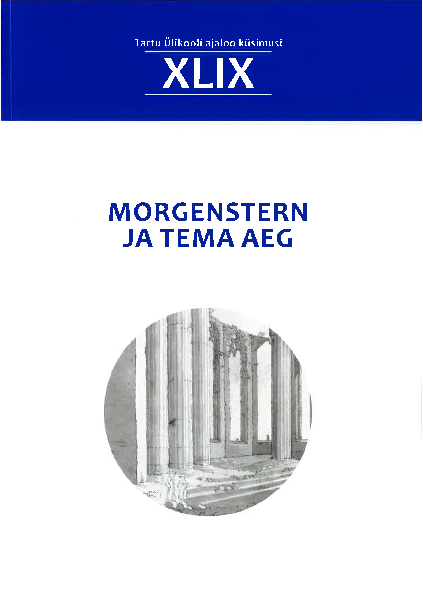Johann Friedrich von Erdmann ja meditsiinitopograafiad Tartu ülikoolis
Johann Friedrich von Erdmann and Medical Topographies at the University of Tartu
DOI:
https://doi.org/10.15157/tyak.vi49.18380Abstract
Johann Friedrich von Erdmann was born in Wittenberg (1778–1846)
in the family of high-ranking clergyman. He acquired an excellent
knowledge of Latin from his father and older brother. He first studied
theology at the University of Wittenberg, but switched to medicine
after a year and became a student of Professor Friedrich Ludwig
Kreysig (1770–1839), largely known for his work with cardiological
diseases. In 1802 Erdmann defended his doctoral thesis on electrolysis
titled Utrum aqua per electricitatem columnae a celeberrimo Volta
inventae in elementa sua dissolvatur? at the University of Wittenberg
and obtained a degree in medicine and surgery. After the defence of
his thesis he completed his studies in Vienna under the supervision
of Johann Peter Frank (1747–1821) who was regarded a pioneer in
the field of public health. After his return to Wittenberg in 1804 Erdmann
became Professor of Pathology and Therapy at the local university.
In 1810 Erdmann was invited to take the post of Professor of Medicine
at Kazan University in Russia. Erdmann accepted the invitation
and as he had no knowledge of Russian, he delivered his lectures
at Kazan University in Latin. In addition to his posts of professor
and dean of the medical faculty (1814–1817), Erdmann was in charge
of inspecting schools at the governorate of Saratov, Simbirsk, Astrakhan,
Perm and Tobolsk. As a member of the school committee, he
undertook long journeys to these governorates from 1815 to 1816,
familiarising himself with the conditions of schools in Russia and the
activities, habits and traditions of the local people. One of his interests
were mineral springs.
On the basis of his impressions of Russia Erdmann compiled a
monograph in three volumes, the first part titled Medizinische Topographie
des Gouvernements und der Stadt Kasan, nebst mehreren
darauf Bezug habenden historischen, geographischen, statistischen
und ethnographischen Notizen von Dr. Johann Friedrich Erdmann.
Beiträge zur Kenntniss des Innern von Russland was printed in 1822
in Tartu. It was meant for Germans to study the conditions in the
heartland of Russia. The author wrote about different peoples living
in Russia, including Finno-Ugric nations.
In 1817 Erdmann was invited to the University of Tartu/Dorpat
to take the position of Professor of Pathology, Semeiotics, Therapy
and Clinics. He became head of the polyclinic as well. Erdmann's first
period of activity in Tartu lasted from 1818 to 1823, after which he
headed to Germany to improve his health. In 1828 he returned to
Tartu and became Professor of Dietetics, Pharmaceutics, History of
Medicine and Medical Literature. He was also Dean of the Faculty of
Medicine and head of the Institute of Professors. Erdmann retired in
1843 and returned to Germany, where he died in Wiesbaden in 1846.
After Erdmann's first period of professorship, several medical topographical
dissertations were written and defended at the University
of Tartu from 1823 to 1848. Thus, in 1823 a medical topography
was compiled about Tartu, followed by dissertations about Riga
(1828), Archangelsk (1828), Tallinn (1836), Greece (1836), Courland
(1838) and Orenburg (1848).
Erdmann may have had an influence on the structure of these
works, starting with the history, demographics and climate of the
chosen location. The works frequently include interesting aspects
about ethnographical details, as well as hints about the local languages.
Erdmann’s monograph from 1822 was mostly quoted when the
author of a dissertation described Russian people and their lifestyle.
Erdmann's attitude towards different nations was rather liberal,
whereas in the dissertations presented in Tartu local people were
often criticised.
Future research topics may include the further analysis of Erdmann's
work and correspondence as well researching the medical
topographies presented in Tartu from an ethnological point of view.

